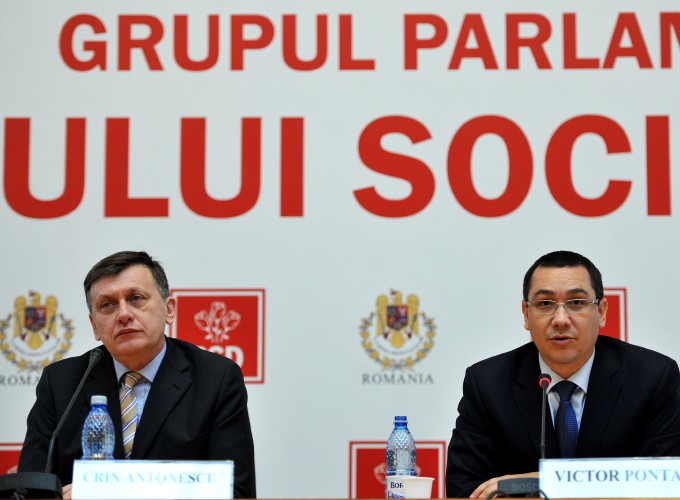Blog post published by presidential-power.com
Romania’s governing coalition broke down on February 25th, when the National Liberal Party (PNL) decided to withdraw its ministers from government and leave the Social Liberal Union (USL) with the Social Democratic Party (PSD). Formally, the liberals’ decision came as a result of the social democrats’ refusal to grant them several key positions in a reshuffled cabinet. However, the gradual deterioration of the relationship between the two parties has been put down to their competing interests in the 2014 presidential election.
The USL was formed in February 2011, when both parties were in opposition. The coalition’s aim was to join forces against President Băsescu’s Liberal Democratic Party (PDL) in the 2012 local and general elections. The two parties signed a political protocol that committed them to stand by a common candidate in the next presidential election. While no particular name was included in the protocol, the understanding was that Victor Ponta, the social democratic leader, would take the prime minister position, while Crin Antonescu, the liberal leader, would become the coalition’s presidential candidate.
The USL came to power in May 2012 without an election, after two successive PDL-led governments collapsed as a result of street protests and after losing a no-confidence vote in the parliament. The USL opposition formed a government with Victor Ponta as prime minister, beginning a period of cohabitation with President Băsescu. Afterwards, the USL majority voted to remove President Băsescu from office but the referendum organised in July 2012 to consult the population on this decision was invalidated due to low electoral turnout. Meanwhile, the USL came first in the 2012 local election and went on to win a supermajority of nearly 70% of the parliamentary seats in the general election later that year.
The 2012 parliamentary election prolonged the period of cohabitation between the USL majority and President Băsescu. However, after a new government was formed by Victor Ponta, the relationship between the liberals and social democrats started to deteriorate.
The two parties clashed over several issues, including the cohabitation pact signed by PM Ponta and Train Băsescu in December 2012. Crin Antonescu was particularly vocal in opposing this document, as he aimed to be perceived as the incumbent president’s most devoted adversary. The liberals also disagreed with the social democrats as far as the Hungarian minority party’s (UDMR) participation in government was concerned as well as on several key appointments to the national anti-corruption agency and the general prosecutor office. During 2013 the main tensions concerned several cabinet appointments, the co-operation between the two parties at local level, and the different stands they took on outstanding pieces of legislation, such as the controversial bill on the Roşia Montana gold mine plan and the amnesty and ‘super-immunity’ bills.
The rift between the two coalition parties deepened in early 2014 and for two reasons. First, the liberals and the social democrats decided to run separate lists at the European Parliament elections, while PSD and the other two parties in the broader USL coalition signed an agreement to run together in these elections as the Social Democratic Union (USD).
Second, the liberals insisted on changing the coalition’s political protocol so that it specifically designates Crin Antonescu as the member parties’ common candidate at the presidential election scheduled for November 2014. The social democrats opposed this move not only because Antonescu was losing ground in approval ratings but also because the PSD has not held the presidency of the country since 2004 and has only spent relatively short periods of time in power since then. In short, the party expects its own leader to run in the presidential race.
The situation is still in flux after PNL left the government. PM Ponta announced that the new cabinet will include the UDMR, which together with the smaller parties in the former USL coalition and the representatives of the national minorities guarantee the formation of a new parliamentary majority. The social democrats also expect to stand their own candidate in the presidential election. However, while Victor Ponta emerges with the best chances of winning this contest, he would rather stay in office as head of government.
The USL’s breakdown could contribute to a further fragmentation of the centre right. Călin Popescu Tăriceanu, the former leader of the PNL and prime minister between 2004 and 2008, has already left the party as a result of Crin Antonescu’s decision to break the governing coalition. He aims to set up a new liberal party and to contest the presidential race. Antonescu’s falling popularity could also lead to the emergence of alternative candidacies within the PNL. After the 2012 general election, when it obtained only 14% of the parliamentary seats, the PDL lost President Băsescu’s support and many of its high-profile members have now formed a new Popular Movement Party. Both parties are preparing to field their own presidential candidates. In this context, the European Parliament elections could be used as a test for the relative strength of the centre-right groupings and might be followed by new electoral alliances and joint candidacies that would stand a better chance against the social democratic contender.


